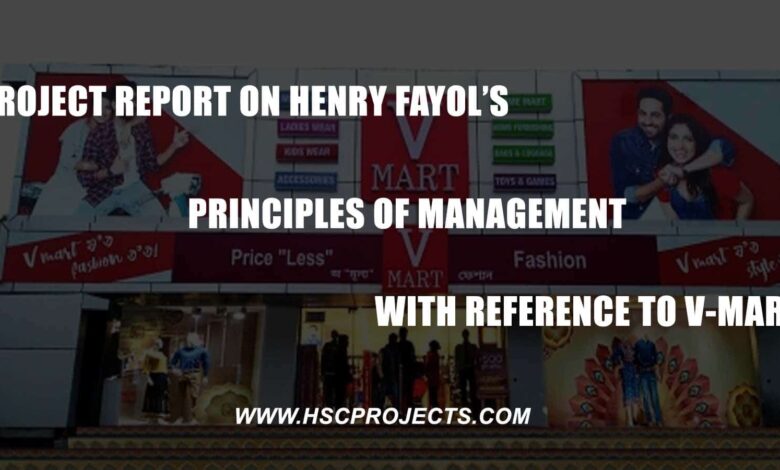
Project On 14 Principle Of Henri Fayol Management With References To V-Mart
INTRODUCTION:
About All Topics:
The study’s title is –“Project Report on Henri Fayol 14 Principle of management with reference to V-Mart.”
According to Koontz and O Donnell. ”Management Principles are fundamental truth of general validity which have value in predicting the results of management action.
These days business has assumed wider dimensions as a result of which numerous problems arise in day to day activities, and the manager of the organisation has to solve these problems. A manager needs guidelines to grapple with the problems and run the organisation efficiently. The principles of management guide the manager. That is why the study of henri fayol’s 14 Principles of management is important.
The Study Plan:
The following are the contents of the study plan:
- The objective of the study
- Selection of the organisation
- Subject Matter of the study
- Period of the Study
- Observation tools used
The Objective of the Study:
The chief purpose of this project is to see the henri fayol’s 14 principles of management being implemented in real life. With its help, we shall get important whether the principles of management which we come across in the books are true? And whether by following the henri fayol 14 principle of management, the efficiency of the managers is enhanced.
Selection of the Organisation:
To achieve the objective of this project, we need an organisation where the business is carried on a large business, and various activities are performed. On the advice of the project guide Mrs Monica Sehgal, V-Mart was selected. The following were the chief reasons for selecting this company.
- It is capable of fulfilling the purpose of the project.
- It is situated nearby and visiting it would be easy.
About the Organisation:

| Name of the company | V-Mart LTD |
| Head office | New Delhi |
| Industry Type | Retail Sector |
| Year of Establishment | 2002 |
| Founder(S) | Mr Lalit Agarwal |
| Mr Hemant Agarwal | |
| Area Served | Local |
| No. of Employees | 80 |
| Annual Sales | Rs-80 Crores |
| Annual Profit | Rs-20 Crores |
| Fixed Assets | Rs-10 Crores |
| Company Type | Private Limited |
Subject Matter of the Study:
Under this project, the henri fayol’s 14 principles of management were studied. These principles are as follows:
- Division of Work
- Authority of Responsibility
- Discipline
- Unity of Command
- Unity of direction
- Subordination of Individual Interest to General Interest
- Remuneration of Employees
- Centralisation + Decentralisation (Effective centralisation)
- Scalar chain
- Order
- Equality
- Stability of Personnel
- Initiative
- Esprit de Corps
Period of the Study:
The period of study happens to be one year. So far as the class is concerned, 30 periods have been provided.
Observation Tools Used are henri fayol 14 principle of management:
- Authority + Responsibility
- Unity of Command
- Subordination of Individual Interest to General Interest
- Remuneration of employees
- Centralisation + Decentralisation
- Scalar chain
- Equity
- Stability of personnel
- Initiative
- Division of Work
- Discipline
- Unity of Direction
- Order
- Esprit De Corps
QUESTIONNAIRE (USED FOR REPORT MAKING):

| S. No. | Questions | Y | N | N.R | T |
| 1. | Do you have all the authority connected with your work? | ||||
| 2. | Do you get orders from more than one bass? | ||||
| 3. | Do you give top priority to the interests of the company? | ||||
| 4. | Do you get reasonable remuneration? | ||||
| 5. | 1. As the daily decision made by the people concerned? | ||||
| 2. Are the major decision taken only by the higher authorities? | |||||
| 6. | Does the boss of your boss directly communicate with you? | ||||
| 7. | Does your company give equal remuneration to all the employees doing a similar job? | ||||
| 8. | Have you served this company for more than one year? | ||||
| 9. | Does your boss give importance to your suggestion? |
ANALYSIS (BASED ON QUESTIONNAIRE):

1.Authority + Responsibility:
Meaning:
According to this principle,
“Authority and responsibility go hand in hand.”
Result of empirical investigation:
Q-Do you have all the authority connected with your work?
A–
| Yes | No | No | No. of |
| Response | Respondents | ||
| 60 | 10 | 10 | 80 |
Explanation:
About the principle of management – “Authority + Responsibility.” So the company employees were asked to give a reply to the question indicated in the table. A total number of 80 respondents were in favour, while ten responded with a negative reply. However, ten people did not express any opinion.
Conclusion:
The figures given in the table indicate that the employees have the authority to discharge their responsibility regarding the work entrusted to them. It can therefore be said that this henri fayol 14 principle of management is being implemented in this company.
2. Unity of command:
Meaning:
“There should be one and only one boss for every individual employee”-according to this principle.
Result of Empirical Investigation:
Q-Do you get orders from more than one boss?
A–
| Yes | No | No | No of |
| Response | Respondents | ||
| 10 | 66 | 04 | 80 |
Explanation:
Eighty employees of the company were asked to respond about the principle of management – unity of command, to the question given in the table. Only a total of 10 employees responded with ‘yes’ while 66 responded negatively. The remaining 04 employees did not give any reply.
Conclusion:
The figures given in the table tell us that out of 80 employees, 66 employees said that they received orders from a single officer at a time. It can therefore be said that the company has understood the importance of this henri fayol 14 principle of management.
3. Subordination of Individual Interest to General Interest:
Meaning:
According to this principle, “the interest of an organisation should prioritise the interest of any individual employee.”
Result of empirical investigation:
Q-Do you give top priority to the interest of the company?
A–
| Yes | No | No | No. of |
| Response | Respondents | ||
| 67 | 08 | 05 | 80 |
Explanation:
For the principle of management, ”subordination of individual interest to the general welfare, “ 80 employees were asked to respond. Out of 80 employees, 67 responded in favour while the other 08 respondents replied negatively. The remaining 05 employees did not give a response.
Conclusion:
Based on the figures available in the table, it can be asserted that the company employees gave priority to general interest over individual interest. The henri fayol 14 principle of management needs to be observed.
4. Remuneration of employees:

Meaning:
According to this principle, “the employees should be paid fair remuneration, which should give them at least a reasonable standard of living.”
Result of empirical investigation:
Q-Do you get reasonable remuneration?
A–
| Yes | No | No | No. of |
| Response | Respondents | ||
| 35 | 40 | 05 | 80 |
Explanation: Regarding the principle of management. ‘Remuneration to the employees 80 respondents were asked to express their opinion 40 employees said they were not getting reasonable remuneration. On the other hand, 35 employees expressed a positive opinion about it the employees who remained numb on this issue numbered only 05.
Conclusion: Based on the above analysis, nearly 50% of the company’s employees are not happy about the company’s remuneration policy. Therefore, it can undoubtedly be said that the company lags in observing this henri fayol 14 principle of management.
5.Centralisation + Decentralisation:

Meaning:
According to this principle, the superiors should adopt effective centralisation instead of complete centralisation and complete decentralisation.
Result of empirical investigation:
Q1-Are the daily decisions made by the people concerned?
Q2-Are the major decisions taken only by the higher authorities?
A–
| Sr. No. | Yes | No | No Response | No. of |
| Respondents | ||||
| 1. | 66 | 09 | 05 | 80 |
| 2. | 75 | 00 | 05 | 80 |
Conclusion:
The above analysis clearly shows that the company does not adopt a complete centralisation. Neither does it do so in the case of decentralisation. Instead, it can be said that the company follows the principle of centralisation in an effective way.
6. Scalar chain:

Meaning:
According to this principle, the Organisation should have a chain of authority and communication that runs from top to bottom and should be followed by managers and subordinates
Result of empirical investigation:
Q-Does, the boss of your boss directly communicate with you?
A–
| Yes | No | No | No. of |
| Response | Respondents | ||
| 61 | 12 | 07 | 80 |
Explanation:
All the employees were asked the question given in the table regarding the ‘scalar chain’ principle. A total of 61 employees’ answer was negative. The number of employees who did not express any opinion was only 07.
Conclusion:
The above analysis shows that most of the employees vouch for the fact that they have direct communication with their boss’s boss. It is an indication of the fact that while communication between the two people takes place in this manner, a step is being overlooked. It should be our inevitable conclusion that the principle of scalar chain is being violated. This situation is certainly not in favour of the company. The henri fayol 14 principle of management is not observed.
7. Equity:
Meaning:
According to this principle, “The managers should treat their subordinates as somewhat as possible to develop a feeling of dedication for their work.
Result of empirical investigation:
Q-Does, your company give equal remuneration to all the employees doing a similar job?
A–
| Yes | No | No | No. of |
| Response | Respondents | ||
| 45 | 31 | 04 | 80 |
Explanation:
Regarding the principle of ‘Equity’, the question given in the table was to pull all the employees. A total of 45 employees responded positively, while a total of 31 employees responded negatively. Those who did not respond were significantly low, i.e. yeast 04 persons.
Conclusion:
The above analysis establishes the fact that the questions about the principles of equity elicited a mixed response from the employees. It can, therefore, be said that the company is not conscious of observing this henri fayol 14 principle of management. The principle of management gives a rude shock to the efficient and hard-working employees, and they start losing their confidence in the company.
8. Stability of Personnel:
Meaning:
According to this principle, “there should be a stability of tenure of the employees so that the work continues efficiently.”
Result of empirical investigation:
Q-Have you served this company for more than one year?
A–
| Yes | No | No | No. of |
| Response | Respondents | ||
| 28 | 51 | 01 | 80 |
Explanation:
All the 80 Employees of the company were asked the question given in the table regarding the principle ‘stability of personnel.’ More than half the number of employees responded negatively, where 28 employees confirmed the fact that they have served the company for more than one year. Only one person did not express any opinion.
Conclusion:
The above analysis indicates that labour turnover rates in the company are on the higher side. In other words, the employees do not continue to be in the service of the company for a longer period. This situation reflects mismanagement in the company.
Therefore the company has to take care of the stability of the personnel in its own interests and should observe henri fayol 14 princlple of management.
9. Initiative:
Meaning:
According to this principle, “employees in the organisation must be given an opportunity in making and executing a plan.”
Result of empirical investigation:
Q-Does, your boss give importance to your suggestions?
A–
| Yes | No | No | No. of |
| Response | Respondent | ||
| 57 | 18 | 05 | 80 |
Explanation:
To check the implementation of this principle of ‘initiative’ in the company, all the employees were asked the question given in the table. A total number of 57 employees were in favour of the question, while 18 employees gave negative answers. The other five people remained numb to this question.
Conclusion:
The above experiment shows that more than 50% of employees felt that their opinion was given importance. This is a comfortable situation. This encourages initiative and confidence in the employees
ANALYSIS (BASED ON PERSONAL OBSERVATION):

10. Division of Work:
Meaning:
According to these principles, “as far as possible the whole work should be divided into small parts, and each individual should be assigned only one part of the work according to his ability and tact reportedly do that the benefits of specialisation may be achieved.”
Result of empirical investigation:
During the personal observation regarding the principle of division of labour, whatever was observed in the company may be described as follows:
- Close to the entrance gate, the company has located a reception counter. All the customers were being received here. They were told where they could obtain the items they wanted to purchase and which section they should visit.
- When the customer reaches the section concerned, the salesman helps him choose the items of his need here, the sale is finalised, and the salesman hand over a token to the customer and directs him to the payment counter.
- In the meantime, the goods sold are carried to the bill counter.
- From the bill counter, the goods are sent to the packing counter.
- From the packaging counter, the packed material and the bill are sent to the payment counter. The customer is already at the counter along with the token. Here the customer hands over the token, make the payment and takes delivery of the goods purchased.
Conclusion:
The above-stated facts indicate that the company has divided the total work into many parts. All the people perform a particular Job repeatedly. Therefore, it can be said that the henri fayol 14 principle of management, i.e. divisions of work, is actually being observed meticulously.
11. Discipline:
Meaning: According to this principle, ”the organisational rule and employment agreement should be obeyed by both the superiors and subordinates necessary for the organisation’s successful working.”
Result of empirical investigation:
During personnel observation regarding the principle of ‘Discipline’, the following facts came to light:
It was observed that the employee usually got into private conservation the moment they found any opportunity of doing so. They indulged in long conversations over the telephone in a joyful mood. Sometimes the customers were seen being ignored.
Conclusion:
The above facts highlight the important aspect of their conduct. It shows that the employees are not fulfilling their commitment to the company to work honestly for it. Therefore, it can be said that the henri fayol 14 principle management are being violated in the company.
12. Unity of Direction:

Meaning:
According to this principle, “there should be one head and one plan for a group of activities having the same objectives.”
Result of empirical investigation:
During the personal investigation, the following facts came to our notice regarding the principle of ‘Unity of Direction’:
- The company’s business was divided into three main units-Ladies wear, Gents wear, and Kidswear.
- Three different individuals headed all three units.
- Every head Kept a watch over the activities of his unit. e.g. sales, purchase, the attitude or behaviour of the subordinates towards the customers, customers ‘satisfaction etc.
Conclusion:
The above facts make it clear that the company has mainly three units. Every unit has to deal with different kinds of customers with their efforts in different ways. Therefore it is clear that another individual heads each, and he plans and regulates the activities of his unit in his way. The situation tells us that the henri fayol 14 principle of management is being implemented in the company.
13. Order:

Meaning: According to this principle, “a right person should be placed at the right job, and the right thing should be placed at the right place.”
Result of empirical investigation:
During the course of our investigation regarding the principle of ‘order’, the following facts were observed:
- It was found that all the units had arranged their goods in a proper and orderly manner
- Whenever the material/goods got scattered because of the rush of the customers, It was immediately restored in its proper place.
- All the employees were observed to be working in their decided place of work.
Conclusion:
The above description makes it clear that all the goods are placed in their decided place. Similarly, all the employees work only in the pre-determined place of duty. Therefore, it can be said that the henri fayol 14 principle of management is being observed in the company.
14. Esprit De corps:

Meaning:
According to this principle, “a manager should continuously make efforts to develop a team spirit among the subordinated.”
Result of empirical investigation:
During personal investigation, the following facts concerning the principle of Esprit De corps came to light.
- Usually, the managers were seen using the word ‘I’ instead of the word ‘WE.’
- It was also observed that the managers did not show any interest in their subordinates.
Conclusion:
The above facts make it clear that the managers in the company are the victims of the reason why they give importance to the word ‘I’ instead of the term ‘WE’. In such a situation, the question of the feeling of cooperation on the part of employees is simply out of the question. The henri fayol 14 principle of management is indeed being violated in the company. This is not a good situation.
CONCLUSION:
According to Professor W. H. Kilpatrick, “A project is a wholehearted act proceeding in a social environment.”
A project from students’ point of view can be purposeful learning activity, including practical problems, planned and carried out in a real-life manner to achieve specific goals. In other words, project work refers to the successful completion of a study.
This project work has helped study the meaning, techniques and functions of the henri fayol 14 principle of management in a better manner.
Henri fayol 14 Principle of Management are general and broad guidelines for the decision making and behaviour of managers.
Thus this project work was of immense benefit to me.
BIBLIOGRAPHY:
Books:
- NCERT-Textbox in Business Studies for Class XII
- Business studies by R. k. Singla for class XII
Newspaper:
- Hindustan Times
- The Times of India
- Dainik Jagran
Magazines:
- Business and Economy
- Business Today
Internet:
- www.meritnation.com
- www.topperbarining.com
- www.mycbseguide.com
CERTIFICATE:
This is to certify that the content of this project entitled, ‘Project Report on Henri fayol 14 Principle of Management about ‘V-Mart’ by MUKUL GARG is the bonafide work of him submitted to BAL BHARTI PUBLIC SCHOOL LUDHIANA for considering in partial fulfilling of the recrement of CBSE, Delhi for the award of senior school certificate in commerce.
He carried out the original research work under my supervision in the academic year 2016-17. Based on his declaration, I recommend this period report for evaluation.
ACKNOWLEDGEMENT:
I have made efforts in this project. However, it would not have been possible without the support and help of many individuals and organisations. I would like to extend my sincere thanks to all of them.
I thank God for providing me with everything required in completing this project. I am highly indebted to the teacher in charge, “Mrs Monica Sehgal” for his guidance and constant supervision and for providing necessary information regarding this project and for his support in completing the project.
DOWNLOAD PDF OF THE PROJECT

Password: hscprojects.com
In order to download the PDF, You must follow on Youtube. Once done, Click on Submit
Follow On YoutubeSubscribed? Click on Confirm
Download Project On 14 Principle Of Henri Fayol Management With References To V-Mart PDF






